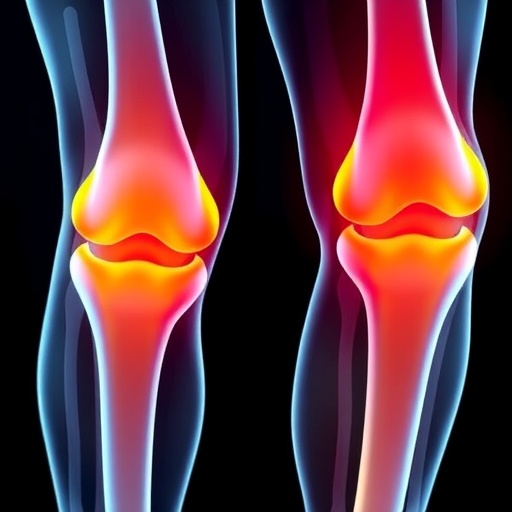An innovative approach using artificial intelligence (AI) is paving the way for improved predictions regarding the worsening of knee osteoarthritis, a condition that affects millions globally. Researchers from Chongqing Medical University in China have developed a model that integrates a patient’s MRI scans, biochemical markers, and clinical data to assess the likelihood of disease progression. This groundbreaking study, recently published in the prestigious journal PLOS Medicine, sheds new light on the potential for AI to advance personalized healthcare strategies for patients suffering from osteoarthritis.
Knee osteoarthritis is a degenerative joint disease characterized by the gradual deterioration of cartilage in the knee, leading to associated pain and stiffness. Currently, the worldwide prevalence of this condition stands at approximately 303.1 million people. The ability to forecast the course of knee osteoarthritis is crucial, as it allows healthcare providers to offer timely interventions that could enhance patient outcomes and potentially delay the need for surgical procedures such as total knee replacements. While previous research has explored the use of computational models, the integration of various data types into a unified predictive framework has been unexpectedly scarce.
To address this void, the research team led by Ting Wang embarked on a comprehensive study utilizing an extensive dataset from the Foundation of the National Institutes of Health Osteoarthritis Biomarkers Consortium. This resource logged relevant clinical assessments, biochemical test results, and an impressive total of 1,753 knee MRIs taken from 594 participants over a two-year period. By employing AI tools and algorithms, the researchers harvested insights from the data to create a robust predictive model that could respond to the multifaceted nature of knee osteoarthritis progression.
.adsslot_7iPxlG1vSW{ width:728px !important; height:90px !important; }
@media (max-width:1199px) { .adsslot_7iPxlG1vSW{ width:468px !important; height:60px !important; } }
@media (max-width:767px) { .adsslot_7iPxlG1vSW{ width:320px !important; height:50px !important; } }
ADVERTISEMENT
The model they developed, dubbed the Load-Bearing Tissue Radiomic plus Biochemical biomarker and Clinical variable Model (LBTRBC-M), represents a significant step forward in predictive analytics for musculoskeletal disorders. By harnessing the potential of AI, the researchers used half of the dataset to train the model, learning from the diverse input of imaging, biochemical markers, and clinical observations. Subsequently, the model was rigorously tested against the remaining half of the data to ensure its predictive accuracy and reliability in forecasting worsening outcomes for patients.
In the evaluation phase, the LBTRBC-M demonstrated actionable accuracy when predicting various worsening scenarios, including patients experiencing increased pain without structural changes, those suffering both worsening pain and detectable joint space narrowing, and patients exhibiting joint space narrowing without additional pain. Encouragingly, participant responses indicate that the model increased the predictive accuracy of seven resident physicians from an initial 46.9% to an impressive 65.4%. Such a pronounced improvement represents more than just statistical progress; it suggests a substantial enhancement in clinician confidence and decision-making capabilities regarding treatment modalities.
The implications of the LBTRBC-M model reach far beyond mere numbers. For patients with knee osteoarthritis, personalized intervention based on precise forecasts could meaningfully impact the trajectory of treatment, potentially preventing further joint deterioration and addressing pain effectively before it escalates into debilitating experiences. The authors of the study emphasize the relevance of these findings, asserting that the integration of deep learning with longitudinal MRI data and biological markers significantly refines the approach to predicting disease progression.
Co-author Professor Changhai Ding expressed enthusiasm about the study’s implications for clinical application, noting that this research is not an isolated endeavor but rather a culmination of years spent collaborating across various disciplines. This interdisciplinary approach has successfully brought cutting-edge AI technology to bear on complex datasets, enlightening clinical practices in musculoskeletal health.
While these findings are promising, the study’s authors recognize that further validation and refinement of the LBTRBC-M model are necessary, particularly through additional clinical trials involving diverse patient populations. Continuous iterations of the model could enhance its effectiveness and widen its relevance as a clinical tool, ultimately ensuring comprehensive benefits for patients grappling with knee osteoarthritis.
Moreover, the study opens the door to future research aimed at better understanding the interaction between radiomics, biochemical markers, and clinical variables in predicting not just osteoarthritis but other degenerative diseases as well. As demonstrated by this groundbreaking work, the fusion of AI and intricate medical knowledge could serve as a game changer in the realm of medical diagnostics and treatment, driving forward the future of healthcare into a more anticipatory and preventive mode of practice.
The research team concludes by highlighting that this is just the beginning, remarking on the immense potential for applications of advanced AI techniques to unravel further complexities in chronic diseases, thereby transforming how medicine foresees and treats various conditions. This study serves as a clear testament to the necessity of evolving our understanding of osteoarthritis and similar health challenges through the integration of innovative technology and interdisciplinary insights.
In a world where health conditions burden countless individuals, the LBTRBC-M model symbolizes hope—a tangible step towards a future where predictive accuracy guides personalized medicine, significantly improving quality of life for individuals living with knee osteoarthritis.
Subject of Research: People with knee osteoarthritis
Article Title: Predicting knee osteoarthritis progression using neural network with longitudinal MRI radiomics, and biochemical biomarkers: A modeling study.
News Publication Date: August 21, 2025
Web References: PLOS Medicine
References: Wang T, Liu H, Zhao W, Cao P, Li J, Chen T, et al. (2025)
Image Credits: Wang T, et al., 2025, PLOS Medicine, CC-BY 4.0
Keywords
Artificial Intelligence, Knee Osteoarthritis, Predictive Modelling, MRI, Biochemical Biomarkers, Machine Learning, Personalised Medicine, Research Studies, Healthcare Innovation, Chronic Diseases.
Tags: AI-driven healthcare predictionsbiochemical markers in knee osteoarthritisChongqing Medical University osteoarthritis studyclinical data integration for health predictionsdegenerative joint disease researchimproving patient outcomes in knee osteoarthritisinnovative AI models in medicineknee osteoarthritis progression forecastingMRI scans in osteoarthritis assessmentpersonalized healthcare strategies for osteoarthritisPLOS Medicine osteoarthritis publicationsurgical intervention delay for osteoarthritis patients





